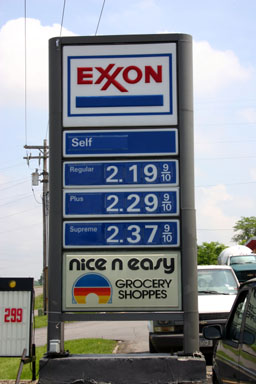May 1, 2006
Oil prices and Dryden
I've written a few times about what impact rising gas prices might have on Dryden, but it looks like we're now going to be getting used to $3.00 gas that was just speculation two years ago. Energy Secretary Sam Bodman thinks this will last about three years, "before suppliers are going to be in a position to meet the demands of those who are consuming this product."
I'm not sure where those extra supplies of oil are going to come from, when there haven't been a lot of exciting discoveries and demand for oil is increasing all over the world. It seems likely that prices are going to keep climbing, unless people suddenly start using a lot less of the stuff. (Three years is also a convenient prediction, as it can't be evaluated until we're past the next presidential election cycle.)
It seems like it's time to start thinking about what we can do locally. Drilling for oil here isn't likely to work - Dryden seems to be a bit east of the natural gas deposits in the Finger Lakes, and well east of New York's few oil wells near Olean. It's a prime time to consider generating power with wind and solar technologies, even if the Town Attorney considers them a fad.
It may be time, though, to start looking at what increased oil and gas prices will mean for development here generally. Dryden is going to be less attractive for people driving to Ithaca or Cortland - though it may become more attractive to people already driving to Ithaca from Cortland or vice-versa. Highway Superintendent Jack Bush has definitely noticed the price of asphalt climbing - are we willing to pay for the asphalt to pave the roads the way we've been used to? The town will be re-examining zoning as part of the implementation of the Comprehensive Plan, and it might be wise to factor higher transportation costs into those decisions.
I know there isn't much the Town can do about high gas prices, but I suspect this shift may produce the largest issues Dryden's faced in a long while, changing real estate values, business prospects, and tolerance for taxation as costs go up for both taxpayers and the government.
(And no, I don't think blaming the oil companies will get us very far. Even if they were operating as non-profits, something I'd enjoy seeing though it's unlikely, the basic problem seems to be too little supply for too much demand. A serious and permanent reduction in price will require either a lot more supply or a lot less demand.)
Posted by simon at May 1, 2006 9:58 PM in energy , planning and zoningNote on photos
